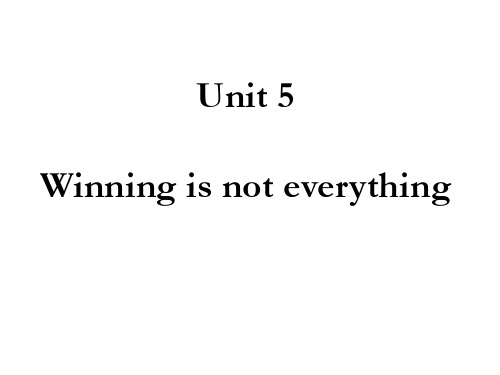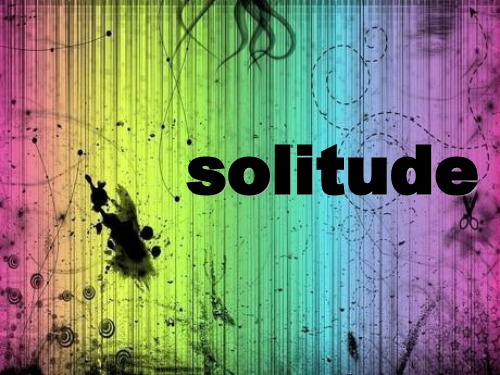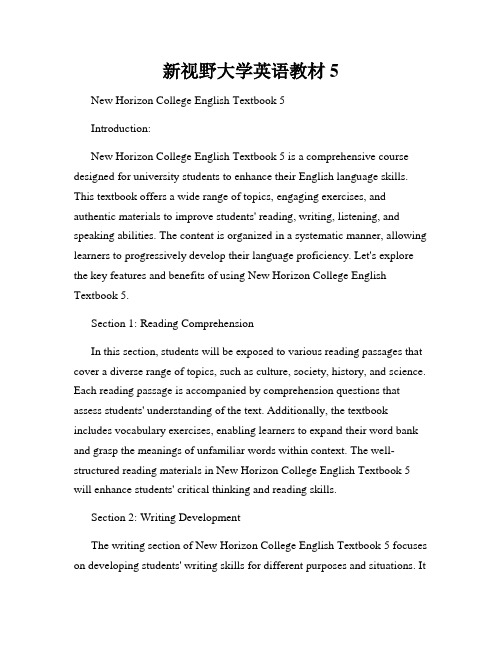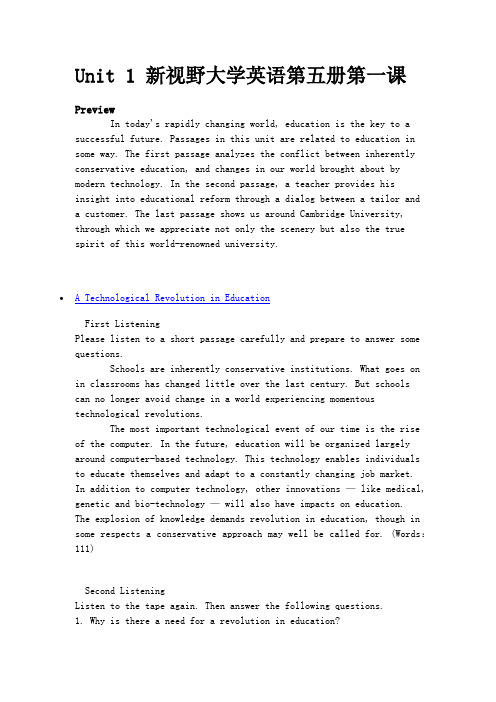新视野大学英语第五册篇章分析-课件
- 格式:ppt
- 大小:344.00 KB
- 文档页数:4




新视野大学英语教材5New Horizon College English Textbook 5Introduction:New Horizon College English Textbook 5 is a comprehensive course designed for university students to enhance their English language skills. This textbook offers a wide range of topics, engaging exercises, and authentic materials to improve students' reading, writing, listening, and speaking abilities. The content is organized in a systematic manner, allowing learners to progressively develop their language proficiency. Let's explore the key features and benefits of using New Horizon College English Textbook 5.Section 1: Reading ComprehensionIn this section, students will be exposed to various reading passages that cover a diverse range of topics, such as culture, society, history, and science. Each reading passage is accompanied by comprehension questions that assess students' understanding of the text. Additionally, the textbook includes vocabulary exercises, enabling learners to expand their word bank and grasp the meanings of unfamiliar words within context. The well-structured reading materials in New Horizon College English Textbook 5 will enhance students' critical thinking and reading skills.Section 2: Writing DevelopmentThe writing section of New Horizon College English Textbook 5 focuses on developing students' writing skills for different purposes and situations. Itprovides explicit instruction on various writing genres, including descriptive essays, argumentative essays, and personal narratives. Through guided exercises and model examples, learners can learn how to effectively organize their ideas, use appropriate grammatical structures, and convey their thoughts coherently in written form. The practical writing tasks in this section enable students to improve their written communication skills.Section 3: Listening and Speaking PracticeTo strengthen students' listening and speaking abilities, New Horizon College English Textbook 5 presents authentic audio materials that simulate real-life scenarios and academic contexts. The listening exercises allow learners to improve their comprehension skills, identify specific details, and extract key information. Meanwhile, the speaking activities encourage students to express their opinions, engage in discussions, and deliver presentations. By actively engaging in these activities, students can enhance their overall communication skills and fluency.Section 4: Language FocusThis section of the textbook focuses on grammar, vocabulary, and language skills. Through concise explanations, examples, and practice exercises, students can consolidate their understanding of crucial language components. The language focus section covers various grammar points, such as tenses, modals, prepositions, and verb patterns. Additionally, it introduces new vocabulary through contextualized exercises, helping students enrich their lexicon and improve their word usage. The language focus section serves as a valuable resource for students to reinforce and enhance their language proficiency.Section 5: Cultural InsightsNew Horizon College English Textbook 5 also provides cultural insights to familiarize students with the English-speaking world. It explores different aspects of culture, including literature, art, customs, and traditions. By studying these cultural insights, students can gain a deeper understanding of the language and broaden their intercultural knowledge. The inclusion of cultural content further enhances the overall learning experience and encourages learners to become well-rounded English speakers.Conclusion:New Horizon College English Textbook 5 offers a comprehensive and structured approach for university students to enhance their English language skills. With its wide range of reading passages, writing tasks, listening materials, and language focus sections, this textbook provides ample opportunities for students to develop their proficiency in all language domains. Additionally, the cultural insights integrated throughout the book contribute to a more holistic learning experience. By utilizing New Horizon College English Textbook 5, students can effectively improve their English language abilities and achieve success in their academic and professional pursuits.。

Unit 1 新视野大学英语第五册第一课PreviewIn today's rapidly changing world, education is the key to a successful future. Passages in this unit are related to education in some way. The first passage analyzes the conflict between inherently conservative education, and changes in our world brought about bymodern technology. In the second passage, a teacher provides hisinsight into educational reform through a dialog between a tailor anda customer. The last passage shows us around Cambridge University,through which we appreciate not only the scenery but also the true spirit of this world-renowned university.• A Technological Revolution in EducationFirst ListeningPlease listen to a short passage carefully and prepare to answer some questions.Schools are inherently conservative institutions. What goes on in classrooms has changed little over the last century. But schools can no longer avoid change in a world experiencing momentoustechnological revolutions.The most important technological event of our time is the rise of the computer. In the future, education will be organized largely around computer-based technology. This technology enables individuals to educate themselves and adapt to a constantly changing job market.In addition to computer technology, other innovations — like medical, genetic and bio-technology — will also have impacts on education.The explosion of knowledge demands revolution in education, though in some respects a conservative approach may well be called for. (Words:111)Second ListeningListen to the tape again. Then answer the following questions.1. Why is there a need for a revolution in education?2. What is the most important technological event of our time?3. What do you imagine a university will be like in the future?• A Technological Revolution in EducationA human being transported from the year 1900 to our time wouldrecognize much of what goes on in today's classrooms—the prevalent lecturing, the emphasis on drill, and the materials and activities ranging from the basic reader to the weekly spelling tests. With the possible exception of the church, few institutions have changed as little as those chargedwith the formal education ofthe next generation.Contrast this continuitywith children's experiencesoutside the schoolwalls. In modern societychildren have access to arange of media that wouldhave seemed like a miraclein an earlier era. Thevisitor from the past, whowould readily recognize today's classroom, would have troublerelating to the out-of-school world of a 10-year-old today.Schools — if not education generally — are inherently conservative institutions. In large measure, I would defend this conservative tendency. But changes in our world are so rapid and so decisive that it will not be possible for schools to remain as they are or to simply introduce a few superficial improvements. Indeed, ifschools do not change rapidly and radically, they are likely to be replaced by other more flexible institutions.The Transforming Power of ComputersThe most important technological event of our time is the rise of the computer. Computers already permeate many aspects of our lives, from transportation and telecommunications to entertainment.Scarcely ignorant of these trends, many schools now have computersand networking capacity. To some extent, these technological accessories have been absorbed into the life of the school, though often they simply deliver the old lessons in a more convenient and efficient format.In the future, however, education will be organized largely around the computer. Computers will permit a degree of individual instruction that in the past was available only to the rich. All students may receive a curriculum tailored to their needs, learning style, pace, and record of success with earlier materials and lessons.Computer technology puts all the information in the world atone's fingers, quite literally. This is both a blessing and a curse. No longer do we have to spend long periods of time hunting down a source or a person — now, delivery of information is instantaneous. Soon we will not even have to type in an instruction; we will be able to simply ask a question out loud and the computerwill print out or speak the answer. Thus people will achieve instant " cultural literacy ".Less happily, the Internet has no means of quality control; "anyone can play". Information and disinformation mingle comfortably and, as of yet, there are no reliable ways todistinguish sense from the distorted facts and downright nonsense common on the Net. Identifying the true, the beautiful, and the good — and which of these truths, beauties, or goods are worth knowing —constitutes a formidable challenge.It might be said, in response, that the world has always beenfilled with misinformation. True enough, but in the past educational authorities could at least choose their favoritetexts. Today's situation, with everyone having instantaneous access to millions of sources, is without precedent.Customizing EducationIn a change fromprevious trends, theacquisition of a diplomafrom certified institutionsmay become less important.Individuals will be able toeducate themselves andexhibit their competence ina simulated setting. Whypay $120,000 to go to lawschool, if one can "readlaw" as in earlier times andthen demonstrate one'srepertoire of legal skillsvia a computer-simulatedpractical examination? Or learn to fly a plane or conduct surgery by similar means, for that matter?Much of education in the past was essentially vocational: designed to make sure that individuals could carry out a single job, reliably, throughout their productive adult years. Nowadays, this assumption is flawed. Few people will remain in the same occupation for their whole lives; many will move frequently from one position, company, and sector of the economy to another. The explosion of new and rapidly changing roles in the economy makes education much more complicated. Most adult teachers and parents will not have experiences on which they can draw to prepare youngsters for a world in which they can expect to change jobs regularly. In the absence of precedent, adolescents will have to prepare themselves for rapidly changing "career paths" and life situations.The Further Effects of TechnologyWhile computer-based teaching figures to be the dominant technological influence on education, other innovations will have impacts as well. Medical technologies will permit study of students' brain activity and blood flow as they engage in various kinds of problem-solving or creative activities.Enhanced understanding of the genetic basis of learning is also likely to invade the classroom. It may be possible to determine which youngsters are likely to advance quickly and which ones seem doomed to "difficult" school experiences. Some authorities will insist that these findings be applied in specific cases, while others will vigorously object to any decisions made on the basis of genetic information. Drugs that claim to improve learning, memory, or enthusiasm will become readilyavailable. Teachers and parents may face moral dilemmas that would in earlier times have been restricted to science fiction.Finally, recent breakthroughs in biology and medicine may change education in the most radical ways. If individuals seek to "design" offspring through genetic engineering, or to alter the genetic structure of an already existing person, or if it becomes possible to clone humans, then our definitions of what it means to be a human being, and to be a part of a human society, will be changed forever.Conservatism Is Not Necessarily EvilI have noted that education is conservative, and that this conservative tendency is not necessarily an evil. Indeed, with respect to the transmission of values and the teaching of certain subjects, a conservative approach may well be called for. Yet the explosion of knowledge calls for close and fresh attention to the curriculum. New and imaginative approaches will have to be developed if young people are to be prepared for the rapidly changing roles they can expect to assume.Words: 1,009• A Technological Revolution in EducationNew WordsPhrases and Expressionsprevalent a. (fml.)existing commonly, generally, or widely (in some place or at some time ); predominant (正式)(在某地或某时)流行的,盛行的;普遍的The habit of traveling by aircraft is becoming more prevalent each year.坐飞机旅行一年比一年普遍了。
